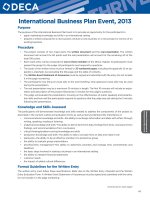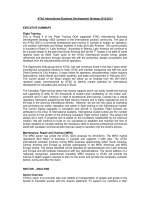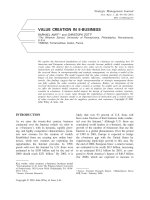Ethics in international business
Bạn đang xem bản rút gọn của tài liệu. Xem và tải ngay bản đầy đủ của tài liệu tại đây (177.43 KB, 40 trang )
International Business 7e
by Charles W.L. Hill
McGraw-Hill/Irwin Copyright © 2009 by The McGraw-Hill Companies, Inc. All rights reserved.
Chapter 4
Ethics in International Business
4-3
Introduction
Ethics refers to accepted principles of right or wrong that
govern the conduct of a person, the members of a
profession, or the actions of an organization
Business ethics are the accepted principles of right or
wrong governing the conduct of business people
Ethical strategy is a strategy, or course of action, that
does not violate these accepted principles
4-4
Ethical Issues In
International Business
The most common ethical issues in business involve:
employment practices
human rights
environmental regulations
corruption
the moral obligation of multinational companies
4-5
Employment Practices
If work conditions in a host nation are clearly inferior to
those in a multinational’s home nation, should companies
apply:
home country standards
host country standards
something in between
4-6
Human Rights
In developed countries, basic human rights such as
freedom of association, freedom of speech, freedom of
assembly, and freedom of movement, are taken for granted
In other countries, these rights may not exist
4-7
Environmental Pollution
Ethical issues arise when environmental regulations in
host nations are far inferior to those in the home nation
Environmental questions take on added importance
because some parts of the environment are a public good
that no one owns, but anyone can despoil
The tragedy of the commons occurs when a resource
held in common by all, but owned by no one, is overused
by individuals, resulting in its degradation
4-8
Corruption
The U.S. Foreign Corrupt Practices Act outlawed the
practice of paying bribes to foreign government officials in
order to gain business
The Convention on Combating Bribery of Foreign Public
Officials in International Business Transactions adopted by
the Organization for Economic Cooperation and
Development (OECD), obliges member states to make the
bribery of foreign public officials a criminal offense
4-9
Corruption
Some economists believe that in a country where
preexisting political structures distort or limit the workings of
the market mechanism, corruption in the form of black-
marketeering, smuggling, and side payments to
government bureaucrats to “speed up” approval for
business investments may actually enhance welfare
Other economists have argued that corruption reduces
the returns on business investment and leads to low
economic growth
4-10
Moral Obligations
Social responsibility refers to the idea that business
people should take the social consequences of economic
actions into account when making business decisions, and
that there should be a presumption in favor of decisions
that have both good economic and good social
consequences
Social responsibility can be supported for its own sake
simply because it is the right way for a business to behave
Advocates argue that businesses need to recognize their
noblesse oblige (honorable and benevolent behavior that is
the responsibility of successful companies) and give
something back to the societies that have made their
success possible
4-11
Classroom Performance System
Which is not an area where multinational firms are
concerned about ethics?
a) Human rights
b) Trade regulations
c) Environmental regulations
d) Corruption
4-12
Ethical Dilemmas
Ethical dilemmas are situations in which none of the
available alternatives seems ethically acceptable
The ethical obligations of a multinational corporation
toward employment conditions, human rights, corruption,
environmental pollution, and the use of power are not
always clear cut
4-13
The Roots Of Unethical Behavior
There is no clear cut reason why managers behave
unethically
The causes of unethical behavior are complex and reflect:
Personal ethics
Decision-making processes
Leadership
Unrealistic performance expectations
Organizational culture
4-14
The Roots Of Unethical Behavior
Figure 4.1: Determinants of Ethical Behavior
4-15
Classroom Performance System
All of the following except ____ contribute to unethical
behavior by international managers.
a) Decision-making processes
b) Leadership
c) Personal ethics
d) National culture
4-16
Personal Ethics
Personal ethics (the generally accepted principles of right
and wrong governing the conduct of individuals) influence
business ethics
Expatriates may face pressure to violate their personal
ethics because they are away from their ordinary social
context and supporting culture, and they are
psychologically and geographically distant from the parent
company
4-17
Decision Making Processes
People may behave unethically because they rely on
economic analysis when making decisions and fail to ask
the relevant question:
Is this decision or action ethical?
4-18
Organizational Culture
Organization culture refers to the values and norms that
are shared among employees of an organization
In firms with an organization culture that does not
emphasize business culture, unethical behavior may exist
4-19
Unrealistic Performance Expectations
When the parent company sets unrealistic performance
goals, managers may cut corners or act in an unethical
manner
Organizational culture can legitimize unethical behavior
or reinforce the need for ethical behavior
4-20
Leadership
Leaders help to establish the culture of an organization,
and set the example that others follow
When leaders act unethically, subordinates may act
unethically, too
4-21
Philosophical Approaches To Ethics
There are several different approaches to business ethics
Some approaches deny the value of business ethics or
apply the concept in an unsatisfactory way
Others are favored by moral philosophers and are the
basis for current models of ethical behavior
4-22
Straw Men
Straw men approaches offer inappropriate guidelines for ethical
decision making in a multinational enterprise
There are four common straw men approaches:
The Friedman doctrine suggests that the only social responsibility of
business is to increase profits, so long as the company stays within the
rules of law
Cultural relativism argues that ethics are culturally determined and
that firms should adopt the ethics of the cultures in which they operate,
or in other words, “when in Rome, do as the Romans do”
The righteous moralist approach claims that a multinational’s home
country standards of ethics should be followed in foreign countries
The naïve immoralist asserts that if a manager of a multinational
sees that firms from other nations are not following ethical norms in a
host nation, that manager should not either
4-23
Classroom Performance System
According to ________, a company’s home-country
standards of ethics are the appropriate ones to follow in
foreign countries.
a) the righteous moralist
b) the naïve immoralist
c) the Friedman doctrine
d) cultural relativism
4-24
Utilitarian And Kantian Ethics
Utilitarian approaches to ethics hold that the moral worth
of actions or practices is determined by their consequences
Actions are desirable if they lead to the best possible
balance of good consequences over bad consequences
Problems with utilitarianism include measuring the
benefits, costs, and risks of an action, and the fact that the
approach fails to consider justice
Kantian ethics are based on the philosophy of Immanuel
Kant who argued that people should be treated as ends
and never purely as means to the ends of others
4-25
Rights Theories
Rights theories recognize that human beings have
fundamental rights and privileges which transcend national
boundaries and cultures
Rights theories establish a minimum level of morally
acceptable behavior
Moral theorists argue that fundamental human rights form
the basis for the moral compass that managers should
navigate by when making decisions which have an ethical
component









